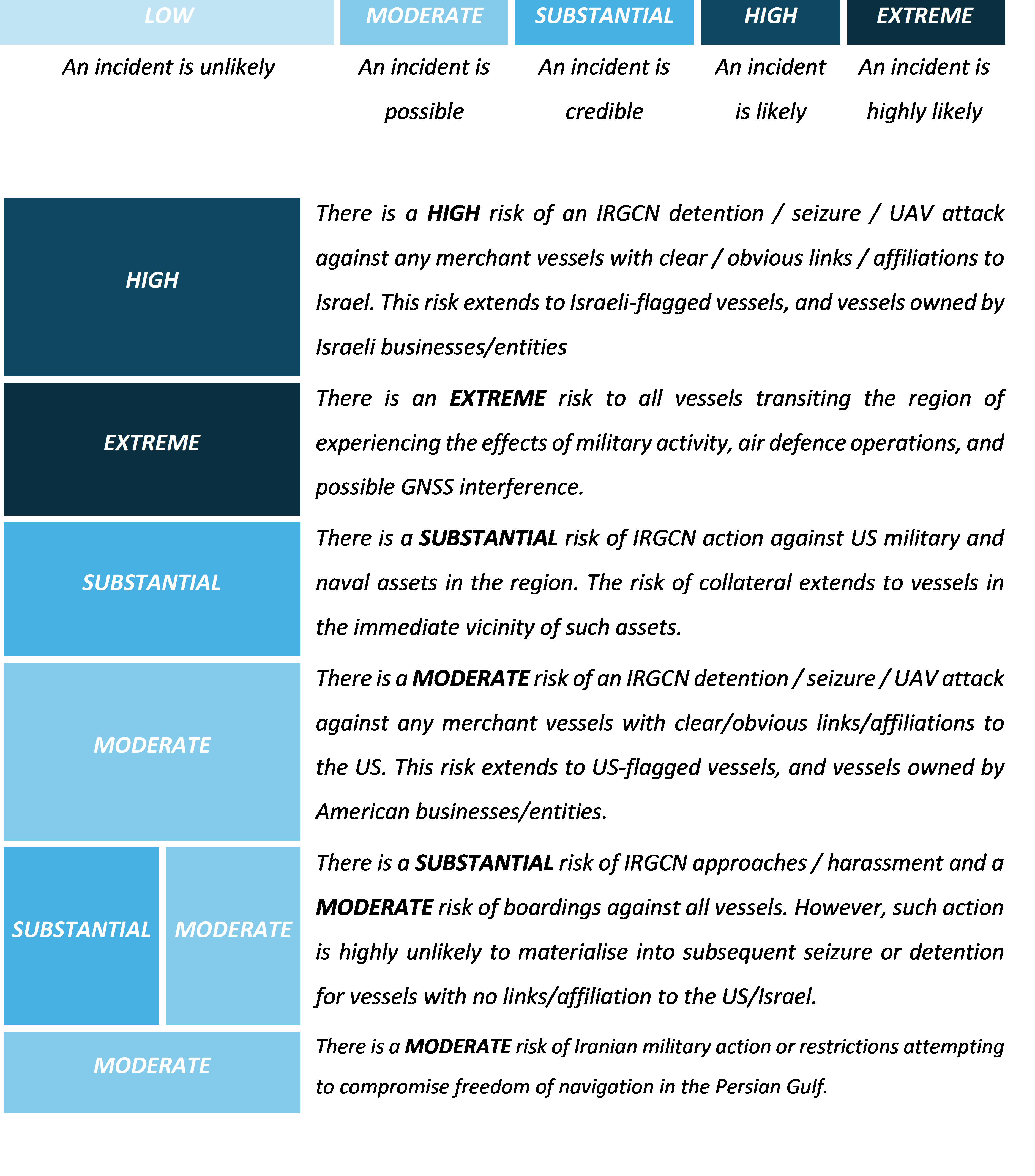
Recent attacks between Israel and Iran have significantly heightened tensions in the area, raising concerns for the safety of merchant vessels in and around the Arabian/Persian Gulf and Israeli waters.
Updated 23 June 2025
Published 18 June 2025
The situation is evolving rapidly, and there is a risk of spillover effects impacting shipping. With permission from Vanguard, we reproduce below their comprehensive risk analysis and mitigation measures for our clients.
Persian Gulf
On 23 June, US President Trump declared that a “complete and total” 12-hour ceasefire had been agreed between Israel and Iran, effectively ending what he called the ‘12-day war’. Despite early reports of violations, the ceasefire appears to be holding. Israeli PM Benjamin Netanyahu stated that "Israel agreed to the President's proposal for a mutual ceasefire." Iranian Foreign Minister Abbas Araghchi, while denying any formal agreement, said that "provided that the Israeli regime stops its illegal aggression against the Iranian people no later than 4 am Tehran time, we have no intention to continue our response afterwards." The Iranian Supreme National Security Council (SNSC) also confirmed that Iran would adhere to the ceasefire, warning against "any provocative military actions."
On 25 June, Iran's parliament approved a bill to suspend the country's cooperation with the International Atomic Energy Agency (IAEA). The bill still requires final approval from the Supreme National Security Council before it becomes official policy. Earlier, Iran's Foreign Minister, Abbas Araghchi, stated that uranium enrichment in Iran will continue "with or without an agreement."
As of 25 June, the Strait of Hormuz remains open. On 24 June, 130 vessels transited the strait, with 61 transiting eastbound and 69 westbound. This was higher than the average of 111 vessels transiting daily between 17 - 23 June 2025. Separately, vessels continued to report GPS and GNSS interference in the Strait of Hormuz over the past 24 hours.
As of 25 June 2025, no large-scale hostilities have been reported in the Persian Gulf, and no specific threats have been formally communicated toward maritime vessels and traffic in the region. Military activity in the Persian Gulf has been restricted to GPS / GNSS interference and military drills carried out by the IRGC Navy. Between 17 – 22 June, at least four Iranian officials made statements suggesting a possible militarisation of the SoH and the Iranian parliament voted to close the Strait of Hormuz (SoH); alongside continued growing IRGCN GPS/GNS interference. However, as of 24 June 2025 no large-scale hostilities have been reported in the Persian Gulf and no specific threats have been formally communicated toward maritime vessels and traffic in the region.
Therefore, as of 25 June, Vanguard assesses:

Israel / Gaza / West Bank
As of 25 June, hostilities have been continuing undisrupted in Gaza, including but not limited to Rafah, Gaza City, Deir al-Balah, Jabalya and the Nuseirat camp. On 25 June, at least 86 Palestinians were killed amid hostilities in the enclave. At least 27 of them were killed while waiting for aid in Rafah, southern Gaza, and another 25 were killed and 140 were injured during an incident on Salah al-Din Road, south of Wadi Gaza.
Israel has ended the state of high alert in the West Bank and lifted most movement restrictions following the ceasefire agreement with Iran. Among the eased measures is the reopening of the Al-Aqsa Mosque compound in East Jerusalem, allowing Palestinian worshippers to enter once again.
Electronic interference
As highlighted by Vanguard above, UKMTO, JMIC and several other reports by various organizations, there have been numerous reports of electronic interference in and around the Persian Gulf region. According to Intertanko, there have also been reports of fake Automatic Identification System (AIS) echoes in the region. These false signals, particularly when appearing near your vessel's course, could be used by attackers to induce undesirable navigational actions.
Navigators should therefore be prepared to navigate using terrestrial and dead-reckoning methods. This alternative navigation may be necessary for extended periods until satellite signals are restored. The Automatic Identification System (AIS) itself is also likely to be affected by jamming or spoofing attacks. Any AIS data, especially regarding the positions of other vessels, should be used with extreme caution.
For detailed guidance on detecting and mitigating GPS disruption, reference can be made to Intertanko’s Jamming and Spoofing of GNSS publication. Additionally, Gard has published a case study on a grounding incident caused by GPS disruption, which can be found here.
Vanguard recommends the following mitigation measures:
Strict adherence to counter-piracy BMP Maritime Security (MS).
Affiliation checks as part of the pre-transit Voyage Risk Assessment (VRA).
Heightened vigilance – AIS, visual and radar adjusted for small craft.
Registration & maintaining communication with MSCIO and UKMTO to stay informed about potential threats and updates.
In the event of Unmanned Aerial Vehicle (UAV)/projectile sighting, please ensure crew are briefed and gather in the appropriate Safe Muster Point (SMP); the SMP should be within the superstructure, and above the waterline.
Be prepared for potential GPS malfunctions. Exercise increased caution during navigation by maintaining enhanced visual lookouts and relying more heavily on radar-based navigation.
Maintain awareness of any vessels that are not transmitting their AIS – should the crew sight any such cases, please maintain a safe distance from such crafts.
Should the crew sight anything suspicious or unusual, please report to CSO, UKMTO watchkeepers
Contractual implications
The ongoing conflict between Israel and Iran can lead to charterparty issues, such as if the Master decides to deviate for the safety of the vessel and crew. As to who bears the costs depends heavily on the terms of the specific charterparty, particularly the routing and war risk clauses (for example BIMCO's CONWARTIME 2013/2025 and VOYWAR 2013/2025).
These clauses generally protect shipowners if the vessel "may be exposed" to war risks, potentially allowing deviation from the agreed or customary route, for the safety of the vessel, her crew and her cargo in the Master’s reasonable assessment. However, the application of these clauses and the financial responsibility for deviation costs hinge on factors such as whether the risks have materially changed since the charterparty's inception, if a specific route was contractually agreed upon, and the specific wording of any war risk clauses. Whether these clauses could be said to be triggered would have to be assessed on a case by case basis.
For a more detailed discussion on contractual and insurance implications, please refer to Gard article Red Sea war risks and insurance implications.
External references
Joint Maritime Information Centre advisories.
Industry transit advice for Persian Gulf, Strait of Hormuz and Sea of Oman
Best Management Practices Maritime Security (replaces BMP 5)
We would like to thank Vanguard-Tech for helping us with this alert.





